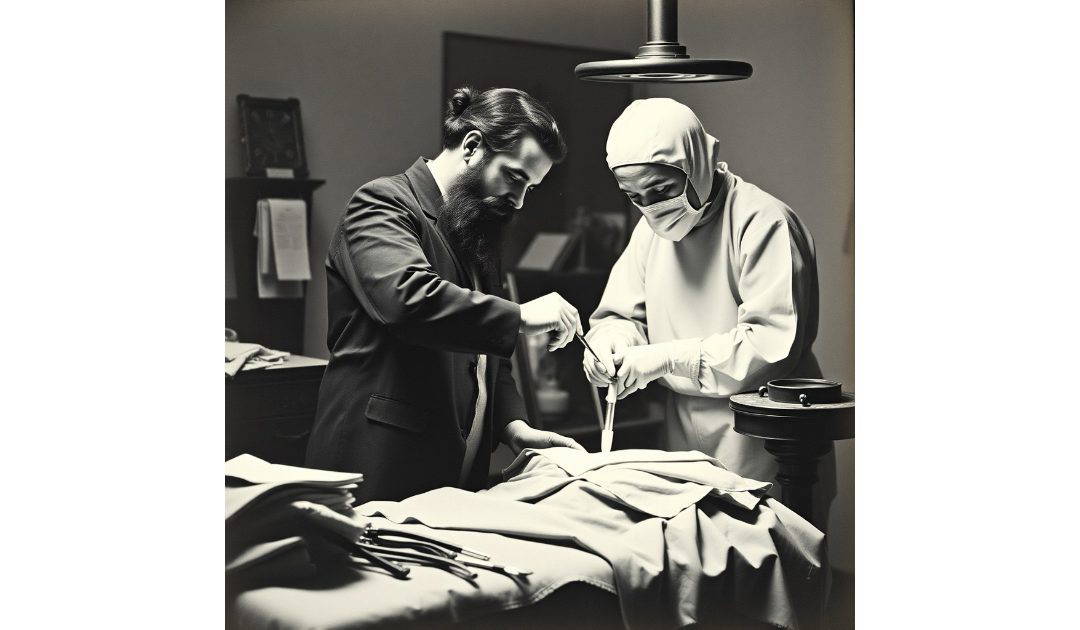On the 12th of August, 1865, Joseph Lister performed the first antiseptic surgery. Since I introduced a doctor as an important character in Called to Account, the fourth book of the Sir Anthony Standen Adventures, I have had to research the history of medicine.
Joseph Lister, born on the 5th of April, 1827, in Upton, Essex, England, was a pioneering British surgeon whose work revolutionised the practice of surgery and significantly reduced postoperative infections. His groundbreaking contributions to antiseptic surgery earned him the title “father of modern surgery.”
Lister grew up in a Quaker family, which valued education and scientific inquiry. His father, Joseph Jackson Lister, was a distinguished wine merchant and amateur scientist known for advancing the design of the achromatic microscope. This environment fostered young Lister’s curiosity and appreciation for meticulous observation.
Lister pursued his medical studies at University College London, earning a Bachelor of Medicine degree in 1852. He was deeply influenced by the renowned surgeon James Syme, under whom he served as an assistant in Edinburgh, Scotland. Lister later married Syme’s daughter, Agnes, who supported his scientific endeavours.
In the mid-19th century, surgical procedures were perilous, often resulting in severe infections and high mortality rates. Despite advances in anaesthesia, which made surgeries less painful, postoperative infections like sepsis, gangrene, and hospitalism remained rampant. The medical community lacked a comprehensive understanding of germ theory, attributing infections to “bad air” or miasma.
Lister’s transformative moment came after reading the work of French chemist and microbiologist Louis Pasteur, who demonstrated that microorganisms caused fermentation and spoilage. Inspired by Pasteur’s germ theory, Lister hypothesised that microorganisms might also be responsible for surgical infections. This hypothesis marked a paradigm shift in medical thinking.
Determined to combat these infections, Lister experimented with antiseptic techniques. He introduced carbolic acid (phenol), previously used to treat sewage, as an antiseptic agent in surgical settings. Lister began applying carbolic acid to wounds, surgical instruments, and dressings, drastically reducing infection rates.
In 1865, Lister achieved a significant breakthrough when he treated an 11-year-old boy with a compound fracture using carbolic acid. The wound healed without infection, marking a pivotal success. Lister meticulously documented his methods and outcomes, publishing his findings in The Lancet medical journal between 1867 and 1869. His articles detailed the principles of antiseptic surgery and showcased remarkable reductions in surgical mortality rates.
Despite initial scepticism and resistance from some of his contemporaries, Lister’s antiseptic techniques gradually gained acceptance. Surgeons who adopted his methods observed improved patient outcomes, leading to widespread adoption across Europe and beyond. His work laid the foundation for aseptic techniques, which emphasised preventing contamination altogether.
Lister’s contributions extended beyond antiseptics. He championed rigorous hygiene practices, such as sterilising surgical instruments, using clean gloves, and maintaining sterile operating environments. These practices became standard protocols, transforming surgery into a safer and more reliable medical discipline.
Throughout his career, Lister held prestigious academic positions, including Professor of Surgery at the University of Glasgow and King’s College London. His reputation grew internationally, earning him numerous honours, including being made a baronet in 1883 and later elevated to the peerage as Baron Lister of Lyme Regis in 1897.
Lister’s influence reached beyond the operating theatre. He was a visionary who recognised the broader implications of germ theory in public health and infection control. His advocacy for scientific principles and evidence-based medicine inspired future generations of medical professionals.
In his later years, Lister continued to receive accolades for his contributions. He was appointed President of the Royal Society and became a member of several prestigious scientific organisations. His legacy was celebrated worldwide, with hospitals, medical schools, and institutions named in his honour.
Joseph Lister passed away on the 10th of February, 1912, at the age of 84. His pioneering work had transformed surgery from a dangerous, often fatal endeavour into a life-saving practice grounded in scientific understanding. Today, his name is synonymous with antisepsis, and his principles continue to underpin modern surgical practices.

